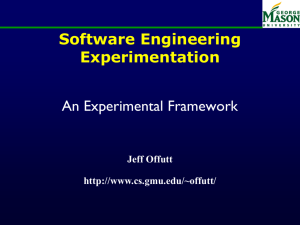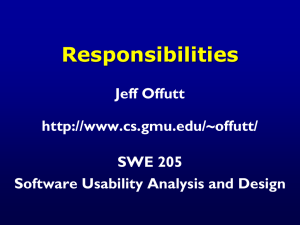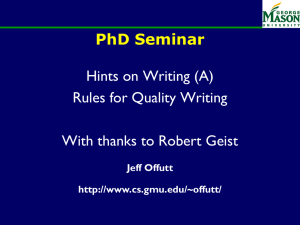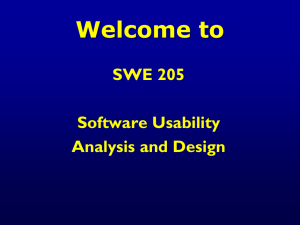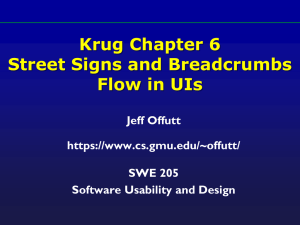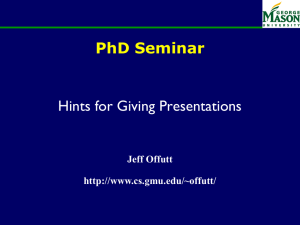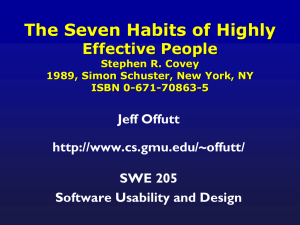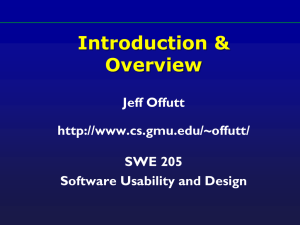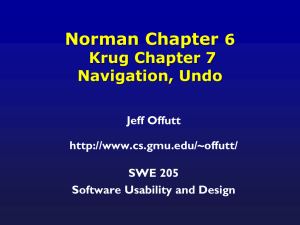PhD Seminar Hints on Writing (C) Common Mistakes From My Graduate Students
advertisement
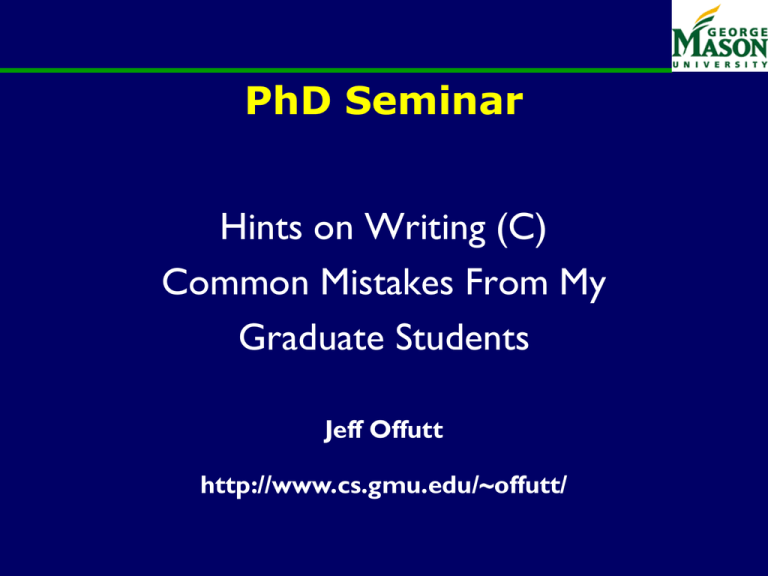
PhD Seminar Hints on Writing (C) Common Mistakes From My Graduate Students Jeff Offutt http://www.cs.gmu.edu/~offutt/ I. Semantic Notes • Lack of precise definitions … assuming the reader already understands the subject • Undefined terms – Define terms, don’t just describe them. • Subjective and imprecise evaluations – (“A is worse than B”, rather than “A is slower than B”) • Discussing solutions without mentioning problems • Mismatched phrases – “Although this freedom is expected to be a benefit because it mimics the way humans process information ...” – How does “freedom” mimic “processing”? – “Inconsistencies detected require expedient resolution and implementation ...” – Do we really want to “implement” the “inconsistencies” ? © Jeff Offutt 2 I. Semantic Notes (2) • Objectives are verbs, not nouns – “Objective is a test document” ... “Objective is to generate a test document” • Conclusions that just summarize, no tying together • Literary style in technical paper – “fall at the side of the road”, “arcane commands” • Useless adjectives • “Utilize” means “to use profitably” • Guesswork based on personal experience – opinions versus facts and measurements – In large classes, students think they learn less – standardized tests indicate class size makes no difference – Differences ? • Speed of grading • Amount of feedback • Popularity is not important in scientific research © Jeff Offutt 3 I. Semantic Notes (3) • Comparative adjectives with only one subject : – – – – “higher” – than what? “less” – than what? “more” – than what? “better” – than what? • Comparing nouns and verbs: – “between the interface and ... what they do ...” – Compare nouns with nouns, verbs with verbs • Value judgments – (good, bad, ...) Why good or bad? • Emotional phrases – exploded (increased) – embrace (use) © Jeff Offutt 4 II. Grammatical Notes • Mentioning one item and calling it several – “A is limited by X ... we need to break away from these constraints” • Plurality mismatch – “basics of X is described”, “advances ... has been” • Plurality mismatch to avoid gender – “...the user where they are...” – “...the users where they are...” • Random use of commas – Too many commas • No spell checking © Jeff Offutt 5 II. Grammatical Notes (2) • et al. – “et. al.” or putting et al. in the references – “et al.” abbreviates “et ali,” which is Latin for “and others” • “i.e.” – “e.g.” : “i.e.” is “id est”, or “that is”, “e.g.” is “exampli gratia”, or “for example” – “for e.g.” sounds like a stuttering problem • “ensure” – “insure” – insure is to procure insurance, ensure is to make sure it happens • article misuse : “the” – “an” – “the object” means there is only one, “an object” means one of many © Jeff Offutt 6 III. Citation Notes • Citations are needed on specific or quantifiable points – Otherwise they becomes opinions, which are irrelevant • • • • Using citations as nouns Missing page numbers in references Inconsistently putting periods before and after citations Incomplete references © Jeff Offutt 7 IV. Stylistic Notes • Inconsistent italics / bolding • Embedded lists (in paragraphs instead of separated) – Do three things: (1) make your point, (2) support your point, (3) stop. • Noise words and phrases just slow us down – “Means by which” – “way” – “The method by which” – “how” • Too many “ing” words are weak – “Make an attempt at increasing ...” – “Make an attempt to increase ...” • Contractions—do not contract in a technical paper • Weak sentence beginnings are passive – “There are three ways to do it, …” – “Three ways to do it are …” • Single dash for separator—use long or double dash • Run-on sentences—break up into multiple sentences • “viz”– few people know what that means © Jeff Offutt 8 IV. Stylistic Notes (2) • Do not use unnecessary colons • Do not Capitalize all Important Words • Do not use binders : This makes it difficult to make comments, especially in drafts – Unless a (probably inexperienced) professor explicitly requires one • Omit first names and titles in the text • Use sections, not chapters © Jeff Offutt 9 V. Organizational Notes • Do not use internal, incomplete references ... saying that something is discussed elsewhere in the paper, but not saying where • Place figures properly … immediately following discussion, preferably on the same page – Never before • Always discuss and explain a figure • Introduce and provide a roadmap for each section • Never follow a section heading with a subsection heading without intervening text © Jeff Offutt 10 Summary • Create your own “oops list” • As you get feedback from friends and professors, add to your oops list • When you conquer a problem, and the correct way becomes a habit, remove it from your oops list © Jeff Offutt 11
